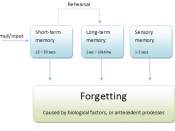Does it ever happen that you forget a name, even if the face is familiar? Canáæt remember the name of your first date? These questions are often associated with aging. Aging causes deterioration in various aspects of memory performance in normal adults. Although age differences in memory are seen in diverse experimental conditions, the effect of aging is not identical in all aspects of memory. Various models and schemes have been proposed to describe human memory function. This report will discuss some of the structural changes that inevitably occur and put into perspective the degree of slowing and functional loss that can be attributed to normal biological aging. To support the physiological view, the following will be examined: the different types of memory, the neuropsychology and neuroanatomy of memory in aging, and successful aging.
Age-related declines in memory do occur and are of real concern to many older people. Yet one of the most striking aspects of the experimental literature is that age-related memory changes are extremely variable.
It appears that some aspects of memory are well maintained as we age, while others are more vulnerable to the effects of aging.
Short term memory refers to the holding of information in the conscious awareness for a short period of time. Long term memory refers to material which is removed from conscious awareness but which is retrievable after longer periods of time. The main affects of aging have shown to take place in long term memory (Winocur, COCR 938, Program 4). A concept closely related to short term memory is working memory which, however, refers to the more complex attentional capacity for simultaneously storing and processing the information needed during cognitive performances. However, although short term memory is well preserved, working memory is strongly affected by aging. This dissociation has been...


